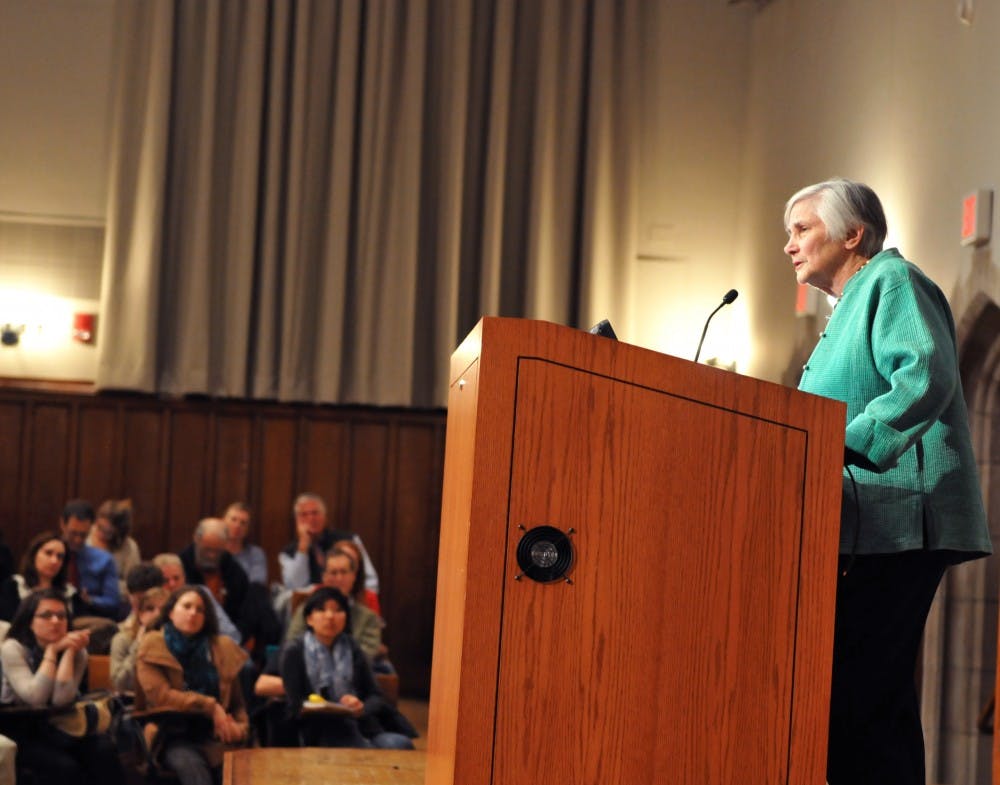The movement to reform the American education system is realizing the opposite of what it intends to do, Diane Ravitch, former U.S. Assistant Secretary of Education from 1991-93 and New York University research professor, argued in a lecture on Monday evening.
The lecture focused on Ravitch’s new book, “Reign of Error: The Hoax of the Privatization Movement and the Danger to America’s Public Schools,” in which she takes issue with several commonly-held ideas regarding public and private schools.
Ravitch said that reformers who advocate cutting budgets, closing schools and firing teachers and staff aren’t aware of the consequences of these changes.
“The so-called reform movement is failing. Nothing that it does works,” Ravitch said.
Reformers think that it would be a good idea to get rid of public schools, but in reality, they are not as big of a problem as they believe, Ravitch said. Test scores and graduation rates are at their highest points in history, while dropout rates are at the lowest that they’ve been, she added.
She argued that reformers are not focusing on the real issues: poverty and segregation.
“The promise of American education is equality of educational opportunity,” Ravitch explained. In order to improve the performance of black and Hispanic students, she advocates placing a greater focus on creating smaller class sizes, greater economic opportunities and desegregating schools.
Ravitch added that reformers are destroying the teaching profession. She cited a statistic that half the teachers in America have less than a year of experience.
She also criticized the movement to evaluate and, in some cases, pay teachers based on students’ test scores.
“You can’t identify great teachers by student test scores,” Ravitch said, arguing that such test results are invalid and unstable. Throughout her lecture, she emphasized that too great a focus is placed on test scores.
According to Ravitch, test scores are only accurate representations of the achievement gap that exists between kids who have more advantages growing up as opposed to those who do not. She called the United States the most over-tested nation in the world.
“The purpose of education should not be to raise test scores,” Ravitch said, arguing instead that the purpose ought to be to enable students to make wise decisions as adults.
Ravitch denounced a practice she calls “deselection,” which she defined as the idea that the more teachers who are fired, the better the schools will be. Ravitch argued that schools should instead hire teachers carefully and then support and respect their employees.
Ravitch also refuted the idea, which she attributed to many members of the reform community, that private schools perform better than public schools. Rather, Ravitch said that private schools focus solely on “risk management.”
“If you have a portfolio, you get rid of the losers,” she explained. For reformers, this means closing schools and getting rid of the struggling students.
In reality, Ravitch argued, children start life with different advantages and disadvantages.
“The achievement gap exists before the first day of school. It starts at home where kids are exposed to different opportunities, vocabulary and learning experiences,” Ravitch said, arguing that it is important to level the playing field for entering students in order to improve their performance.
The lecture took place in McCosh 50 and was sponsored by the Walter E. Edge Lecture Series.







